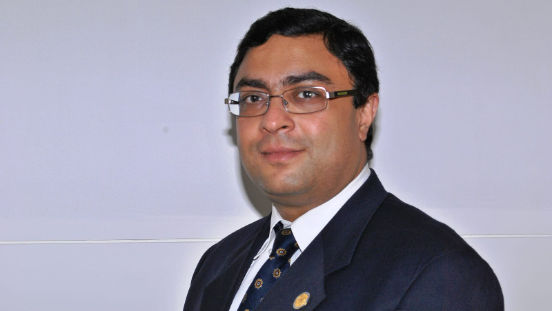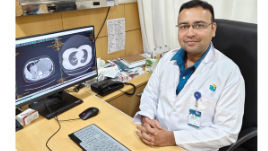Consult Colorectal Surgeons Online (21 doctors)

Dr. Venkatesh Munikrishnan
Colorectal Surgeon
26 Years • MBBS, MRCS, FRCS
Chennai
Apollo Hospitals Greams Road, Chennai
100+ recommendations

Dr. Satyajit Godhi
General and Laparoscopic Surgeon
12 Years • MBBS, MS, Mch
Bengaluru
Apollo Hospitals Bannerghatta Road, Bengaluru

Dr. Varughese Mathai
Colorectal Surgeon
28 Years • MBBS, M.S (Master of Surg.), DNB Surg.
Hyderabad
Apollo Hospitals Jubilee Hills, Hyderabad
50+ recommendations

Dr Shaikat Gupta Director Surgical Onco
Surgical Oncologist
34 Years • MBBS (University Gold Medalist), MS, FRCSEd
Kolkata
Apollo Multispeciality Hospitals , Kolkata, Kolkata

Dr. Chinnaya Parimi
Colorectal Surgeon
16 Years • MBBS, FACS
Hyderabad
Apollo Hospitals Jubilee Hills, Hyderabad
Dr. V R N Vijay Kumar
Surgical Oncologist
9 Years • MBBS, MS (Gen. Surg.), DNB (Surg. Onco.)
Ahmedabad
Apollo Hospitals Gandhinagar, Ahmedabad

Dr. Charita Pradhan
Colorectal Surgeon
20 Years • MBBS, MS, DNB, MRCS, FRCS
Mumbai
Apollo Hospitals CBD Belapur, Mumbai

Dr. Amit Choraria
Surgical Oncologist
18 Years • MBBS, MS (Surgery) Fellow, Surgical Oncology, Tata Medical Center (FSO) Fellow, European Board of Surgery (Surgical Oncology) (FEBS) Fellow, Minimal Access Surgery (FMAS) Fellow, Indian Association of Gastrointestinal Endosurgeons (FIAGES) UICC Fellow, Royal Marsden NHS, London, UK Visiting Scholar, Plastic Reconstructive Surgery, CGMH, Taiwan Fellow, Robotic Surgical Oncology, Vattikuti Foundation, USA
Kolkata
Apollo Multispeciality Hospitals , Kolkata, Kolkata
Dr Supratim Bhattacharyya
Surgical Oncologist
11 Years • MBBS,MS,Mch(Surgical Oncology),Fellowship in Minimally Invasive GI Surgical Oncology and Robotic Surgery
Kolkata
Apollo Multispeciality Hospitals , Kolkata, Kolkata

Dr. Santanu Sarkar
General Surgeon
19 Years • MBBS, MS Genral Surgery
Howrah
ILS HOWRAH., Howrah
What is Colorectal Surgery?
Colorectal surgery is a medical speciality that deals with the diagnosis and treatment of diseases of the colon and rectum. This field of medicine is concerned with the surgical management of conditions affecting the lower gastrointestinal tract, including the colon, rectum, and anus.
A colorectal surgeon specialises in the diagnosis and treatment of disorders of the colon and rectum. These specialists are highly trained medical professionals who have expertise in both general surgery and gastrointestinal surgery. They are skilled in the use of minimally invasive techniques, such as laparoscopy, to treat a wide range of colorectal conditions.
Who is a Colorectal Surgeon?
A colorectal surgeon is a medical professional who specialises in diseases of the colon and rectum. These specialists are highly trained physicians who have completed a residency in general surgery, followed by additional training in colorectal surgery. They are experts in the diagnosis and treatment of conditions affecting the lower gastrointestinal tract.
When Should You Consult a Colorectal Surgeon?
There are several situations in which you may need to consult a colorectal surgeon.
These include:
- Chronic constipation or diarrhoea
- Abdominal pain
- Rectal bleeding
- Hemorrhoids
- Inflammatory bowel disease (IBD)
- Diverticulitis
- Colorectal cancer
If you are experiencing any of these symptoms, it is important to seek medical attention from a qualified healthcare provider. A colorectal surgeon can help diagnose your condition and develop an appropriate treatment plan.
What Medical Conditions Do Colorectal Surgeons Treat?
Colorectal surgeons treat a wide range of medical conditions affecting the lower gastrointestinal tract. These conditions include:
- Colon cancer
- Rectal cancer
- Anal cancer
- Diverticulitis
- Inflammatory bowel disease (IBD), including Crohn's disease and ulcerative colitis
- Hemorrhoids
- Fissures
- Fistulas
- Pilonidal cysts
- Rectal prolapse
What Are the Different Types of Procedures Conducted by Colorectal Surgeons?
Colorectal surgeons use a variety of surgical techniques to treat disorders of the colon and rectum. These techniques include:
- Open surgery: This involves making a large incision in the abdomen to access the colon or rectum.
- Laparoscopic surgery: This is a minimally invasive technique that involves making small incisions in the abdomen and using a tiny camera to guide the surgical instruments.
- Robotic surgery: This is a type of laparoscopic surgery that uses robotic technology to enhance the precision and accuracy of surgical instruments.
- Transanal endoscopic microsurgery (TEM): This is a minimally invasive technique that involves inserting a small camera into the rectum to guide the surgical instruments.
The type of procedure used will depend on the specific condition being treated and the individual needs of each patient.
How Can I Consult a Colorectal Surgeon?
If you are experiencing symptoms related to your colon or rectum, you should consult your primary care physician or gastroenterologist. They may refer you to a colorectal surgeon for further evaluation and treatment.
When you meet with a colorectal surgeon, they will perform a thorough evaluation of your medical history and symptoms. They may order additional tests, such as imaging studies or colonoscopy, to help diagnose your condition.
Once your condition has been diagnosed, your colorectal surgeon will work with you to develop an individualised treatment plan. This may involve medication, lifestyle changes, or surgery, depending on the nature and severity of your condition.
The Role of Colon and Rectal Surgeons in Healthcare
Colon and rectal surgeons play an important role in healthcare by providing specialised care for conditions affecting the lower gastrointestinal tract. Their expertise in both general surgery and gastrointestinal surgery allows them to provide comprehensive care for patients with complex colorectal conditions.
If you are experiencing symptoms related to your colon or rectum, it is important to seek medical attention from a qualified healthcare provider. A colorectal surgeon can help diagnose your condition and develop an appropriate treatment plan to help you achieve the best possible outcome.
Colorectal Surgeons in Other Top Cities
Doctors in Top cities
- •Top Doctors in Hyderabad
- •Top Doctors in Bengaluru
- •Top Doctors in Chennai
- •Top Doctors in Kolkata
- •Top Doctors in Mumbai
- •Top Doctors in New Delhi
- •Top Doctors in Bangalore
- •Top Doctors in Pune
- •Top Doctors in Delhi
- •Top Doctors in Gurugram
- •Top Doctors in East Godavari
- •Top Doctors in Noida
- •Top Doctors in Ahmedabad
- •Top Doctors in Lucknow
- •Top Doctors in Ghaziabad
- •Top Doctors in Visakhapatnam
- •Top Doctors in Guwahati
- •Top Doctors in Madurai
- •Top Doctors in Bhubaneswar
- •Top Doctors in Vijayawada
Related Treatments
- •Treatment for Anal fissure
- •Treatment for Constipation Treatment
- •Treatment for Diverticulitis
- •Treatment for Familial Adenomatous Polyposis
- •Treatment for Fissure
- •Treatment for Fissure In Ano
- •Treatment for hemorrhoids
- •Treatment for Rectal prolapse
- •Treatment for Ulcerative Colitis
- •Treatment for Fistula
- •Treatment for Acute Diarrhea Treatment
- •Treatment for Adopted Child Syndrome Treatment
- •Treatment for Ankle Pain
- •Treatment for fistulae
- •Treatment for Gaucher Disease
FAQs
What are the common colorectal diseases treated by a colorectal surgeon?
A colorectal surgeon treats a range of diseases of the colon and rectum, including colon cancer, inflammatory bowel disease, diverticulitis, and haemorrhoids.
What is a rectal prolapse, and how is it treated by a colorectal surgeon?
Rectal prolapse occurs when the rectum turns inside out and protrudes from the anus. A colon and rectal surgeon can treat rectal prolapse with surgical methods like laparoscopic rectopexy.
How does a colorectal surgeon diagnose colon cancer?
A colorectal surgeon may use various diagnostic tools like colonoscopy, CT scan, or MRI to diagnose colon cancer.
Can a colorectal surgeon treat anal fissures?
Yes, a colorectal surgeon can treat anal fissures through surgical methods like sphincterotomy or fissurectomy.
Is there any difference between a colorectal surgeon and a colon and rectal surgeon?
A colon and rectal surgeon and a colorectal surgeon are the same. These surgeons have completed additional training and certification in treating diseases of the colon and rectum.
What are some risk factors for developing colorectal cancer?
Some risk factors for developing colorectal cancer include age, family history of the disease, smoking, excessive alcohol consumption, and a diet high in red or processed meats.
Is surgery always necessary for treating colorectal diseases?
Surgery may not be necessary for all cases of colorectal diseases. A colon and rectal surgeon may recommend non-surgical treatments like medication or lifestyle changes based on the severity of the condition.
What is an ostomy, and how does a colorectal surgeon perform this procedure?
An ostomy is a surgical opening created in the abdominal wall to allow waste to leave the body when the colon or rectum is removed or damaged. A colorectal surgeon performs this procedure by making an incision in the abdomen and attaching a pouch to collect the waste.
Can a colorectal surgeon treat anal cancer?
Yes, a colorectal surgeon can treat anal cancer through various surgical methods like radiation therapy, chemotherapy, and surgery.
How long does it take to recover from colorectal surgery?
The recovery time from colorectal surgery depends on the type of procedure performed and the individual's overall health. In general, it may take several weeks to months for a full recovery.